What is hyperhidrosis and how does it affect people's lives?
Hyperhidrosis is a medical condition characterized by excessive sweating that goes beyond the body's normal thermoregulatory needs. People with hyperhidrosis experience sweating that is much more pronounced and persistent than what is considered normal, and it can occur in various parts of the body, including the palms, feet, underarms, face, and scalp. The condition affects about 3% of the population and can have a significant impact on people's daily lives, relationships, and emotional wellbeing.
Types and Symptoms of Hyperhidrosis
There are two main types of hyperhidrosis: primary and secondary. Primary hyperhidrosis is the most common form and has no known underlying cause. Secondary hyperhidrosis, on the other hand, is caused by an underlying medical condition such as diabetes, hyperthyroidism, or menopause. Symptoms of hyperhidrosis may vary depending on the type, but the most common signs include frequent sweating, wet or clammy hands and feet, body odor, and skin infections.
Impact on Daily Life
Hyperhidrosis can have a significant impact on people's daily lives. For example, people with excessive sweating may avoid physical activities or social situations for fear of embarrassment or discomfort. It can also interfere with work, school, and relationships, leading to isolation and reduced quality of life. People with hyperhidrosis may feel anxious or depressed due to the social stigma associated with the condition.
Treatment and Management Options
Fortunately, there are several treatment options available for hyperhidrosis. The most common include antiperspirants, medications, iontophoresis, and surgery. Antiperspirants that contain aluminum chloride can be applied to the affected area to reduce sweating. Medications like anticholinergics, beta-blockers, and antidepressants can also be prescribed to manage excessive sweating. Iontophoresis involves passing a mild electric current through water to the affected area, which can reduce sweating. In severe cases, surgery may be recommended to remove sweat glands.
Coping with Hyperhidrosis
In addition to medical treatment, there are several coping strategies that people with hyperhidrosis can adopt. These include wearing loose-fitting clothes made from breathable fabrics, avoiding spicy foods and caffeine, and keeping a towel or change of clothes handy. Regular exercise and stress-reducing techniques like meditation and yoga may also help manage symptoms. It's also essential to seek support from friends, family, or a mental health professional to cope with the emotional impact of hyperhidrosis.
In conclusion, hyperhidrosis is a medical condition that can significantly impact people's daily lives. However, with the right treatment and management strategies, people with hyperhidrosis can lead fulfilling lives and overcome the challenges associated with excessive sweating.

Comments
Post a Comment